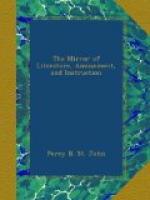Yes, on Sarmatia’s bleeding form
Oppression’s fetters rang,
And Liberty’s last dying dirge the
Northern trumpet sang:
Our hopes were buried in the grave where
Kosciusko lies;
There came not friendship then from earth—nor
mercy from the skies!
But Heaven has roused the Polish slave
and bid him rend his chains,
And now we rank among the free—“Our
country yet remains:”
Again we seek our native rights by God
and Nature given—
A people’s right unto their soil
from us unjustly riven.
We call upon the honoured brave—the
free of every land—
For succour from the powerful—for
aid from every strand:
We ask for every good man’s prayer—we
call for help on high;
Ye shades of Poland’s slaughtered
sons, look on propitiously.
We fight the fight of nations—bear
witness field and storm
To our desert hereafter? Now we
are but braggarts warm—
But by our honest cause, we swear, ere
they our land retake,
Each town shall he a charnel tomb—each
field a gory lake!
CYMBELINE.
* * * * *
THE NATURALIST.
* * * * *
ANECDOTES OF PARROTS.
(For the Mirror.)
“Who taught the Parrot human notes
to try?
’Twas witty want, fierce hunger
to appease.”
Dryden.
A parrot belonging to the sister of the Comte de Buffon (says Bingley,) “would frequently speak to himself, and seem to fancy that some one addressed him. He often asked for his paw, and answered by holding it up. Though he liked to hear the voice of children, he seemed to have an antipathy to them; he pursued them, and bit them till he drew blood. He had also his objects of attachment; and though his choice was not very nice, it was constant. He was excessively fond of the cook-maid; followed her everywhere, sought for, and seldom missed finding her. If she had been some time out of his sight, the bird climbed with his bill and claws to her shoulders, and lavished on her caresses. His fondness had all the marks of close and warm friendship. The girl happened to have a very sore finger, which was tedious in healing, and so painful as to make her scream. While she uttered her moans the parrot never left her chamber. The first thing he did every day, was to pay her a visit; and this tender condolence lasted the whole time of the cure, when he again returned to his former calm and settled attachment. Yet this strong predilection for the girl seems to have been more directed to her office in the kitchen, than to her person; for, when another cook-maid succeeded her, the parrot showed the same degree of fondness[3] to the new comer, the very first day.”




